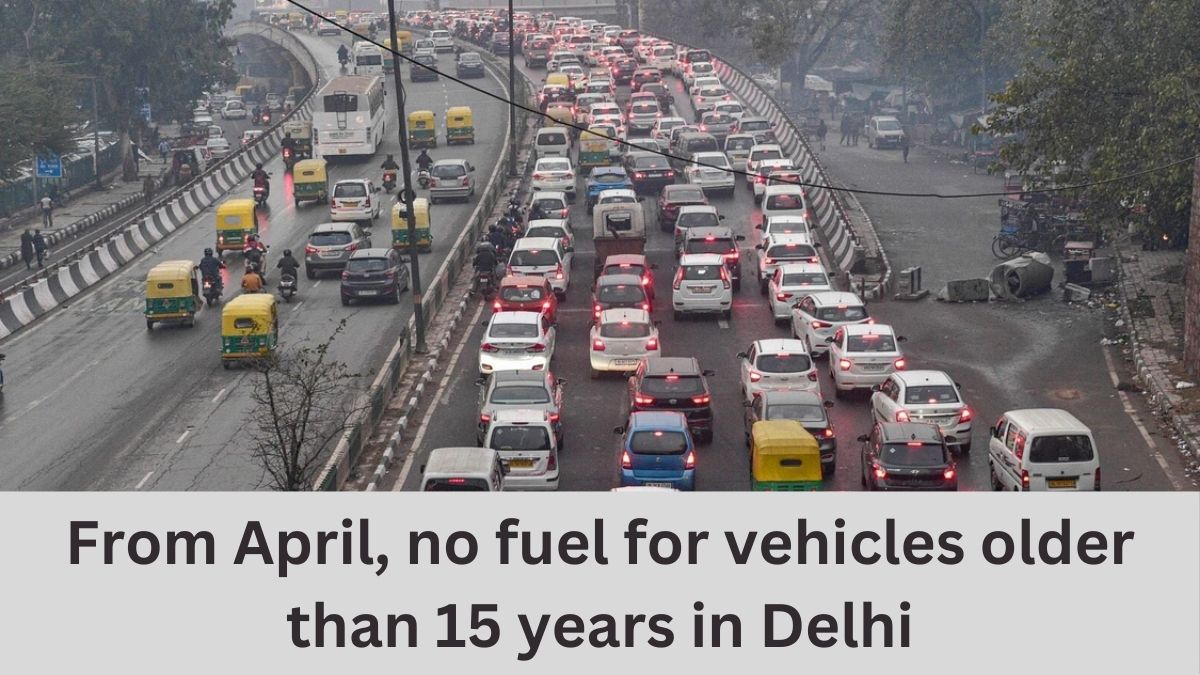In a significant move to combat rising air pollution, the Delhi government has announced a stringent measure: starting April 1, 2024, vehicles older than 15 years will no longer be allowed to refuel at petrol stations across the capital. This initiative is part of a broader strategy aimed at reducing vehicular emissions and promoting cleaner transportation alternatives.
The decision aligns with Delhi’s ongoing efforts to tackle pollution, which has long been a pressing concern for both residents and environmental authorities. With the city grappling with hazardous air quality levels, the government is stepping up its policies to ensure a sustainable and healthier environment.

Key Measures Implemented by the Delhi Government
To effectively enforce this rule and curb pollution levels, the Delhi administration has introduced multiple initiatives:
1. Ban on Fuel for Older Vehicles
To prevent outdated, high-emission vehicles from contributing to pollution, fuel stations will be equipped with specialized identification devices. These gadgets will detect and deny fuel access to any vehicle that has exceeded the 15-year age limit.
This technological intervention ensures strict compliance with the regulation and discourages the use of aging, polluting vehicles. The government will also notify the Union Ministry of Petroleum to ensure a seamless nationwide coordination for this measure.
2. Transition to Electric Public Transport
One of the most ambitious parts of Delhi’s anti-pollution strategy is the phased replacement of CNG buses with electric alternatives. By December 2025, approximately 90% of the city’s public buses will be electric, significantly reducing emissions from public transportation.
This transition is expected to:
- Lower air pollution by eliminating fossil fuel dependence in public transport.
- Improve fuel efficiency and reduce operational costs in the long run.
- Encourage adoption of electric vehicles (EVs) by demonstrating their viability.
3. Mandatory Anti-Smog Equipment for Tall Buildings and Commercial Establishments
Apart from targeting vehicular emissions, the Delhi government is also focusing on pollution control in urban structures. High-rise buildings, hotels, and commercial complexes must install anti-smog devices to filter pollutants from the air.
This initiative aims to:
- Reduce localized pollution in high-density areas.
- Complement existing air purification efforts in public spaces.
- Encourage businesses to adopt eco-friendly solutions for sustainability.
Why Is This Step Necessary?
Alarming Pollution Levels in Delhi
Delhi has consistently ranked among the most polluted cities globally. Vehicular emissions are a major contributor to the poor air quality, alongside industrial emissions and construction dust. Studies have shown that old vehicles emit significantly more particulate matter (PM2.5, PM10) and nitrogen oxides (NOx) than newer, more fuel-efficient models.
Impact of Aged Vehicles on Air Quality
Older vehicles, particularly those running on diesel, release high levels of toxic pollutants. Data from environmental agencies suggest that:
- Vehicles older than 15 years emit three to four times more pollutants than newer models.
- Aged diesel engines contribute heavily to smog formation, worsening respiratory diseases among residents.
By restricting the refueling of such vehicles, the government aims to push residents towards eco-friendly alternatives, such as electric and hybrid vehicles.
Expected Outcomes and Challenges
Projected Benefits
| Benefit | Impact |
|---|---|
| Reduction in vehicle emissions | Lower levels of PM2.5, PM10, and NOx in the air |
| Improved public health | Fewer cases of respiratory diseases and related ailments |
| Boost in electric vehicle adoption | Encourages consumers to transition to EVs |
| Cleaner urban environment | Reduction in smog and improved overall air quality |
Potential Challenges and Solutions
| Challenge | Proposed Solution |
|---|---|
| Resistance from vehicle owners | Government incentives for EV purchases |
| Monitoring and enforcement difficulties | Advanced AI-based vehicle recognition at fuel stations |
| Infrastructure limitations for electric vehicles | Expansion of EV charging stations across the city |
Future Prospects for Delhi’s Air Pollution Control
The ban on fueling older vehicles is just one of many steps in Delhi’s long-term pollution control roadmap. Future strategies may include:
- Extensive promotion of electric two-wheelers and taxis to reduce dependency on fossil fuels.
- Implementation of congestion pricing in high-traffic zones to limit vehicle numbers.
- Expansion of green cover through urban afforestation programs.
Frequently Asked Questions
1. Who will be affected by this ban?
Any vehicle older than 15 years, including private and commercial vehicles, will not be allowed to refuel in Delhi.
2. How will petrol pumps identify older vehicles?
Specialized equipment will be installed at petrol stations to detect the age of vehicles based on their registration details.
3. What should vehicle owners do if their car is older than 15 years?
Owners are encouraged to replace their old vehicles with newer, more eco-friendly alternatives, such as electric or hybrid vehicles. The government may introduce incentives to support this transition.
4. Will there be any exceptions to this rule?
Currently, no exemptions have been announced. However, the government may consider special cases for classic or heritage vehicles used for non-commercial purposes.
5. How will this affect daily commuters?
With the transition to electric public transport, daily commuters can expect cleaner, more efficient transport options. The government also aims to improve metro and e-rickshaw connectivity to accommodate the changes.
The Delhi government’s bold move to ban fuel for vehicles older than 15 years marks a significant step in its fight against air pollution. By integrating technology, policy enforcement, and electric mobility, the city is paving the way for a cleaner and healthier future. While challenges remain, sustained efforts and public cooperation will be key to making Delhi’s air breathable again.
Click here to know more.
Kishan is a knowledgeable writer specializing in agriculture and the latest government job recruitments, delivering clear and insightful content to inform and empower readers.
